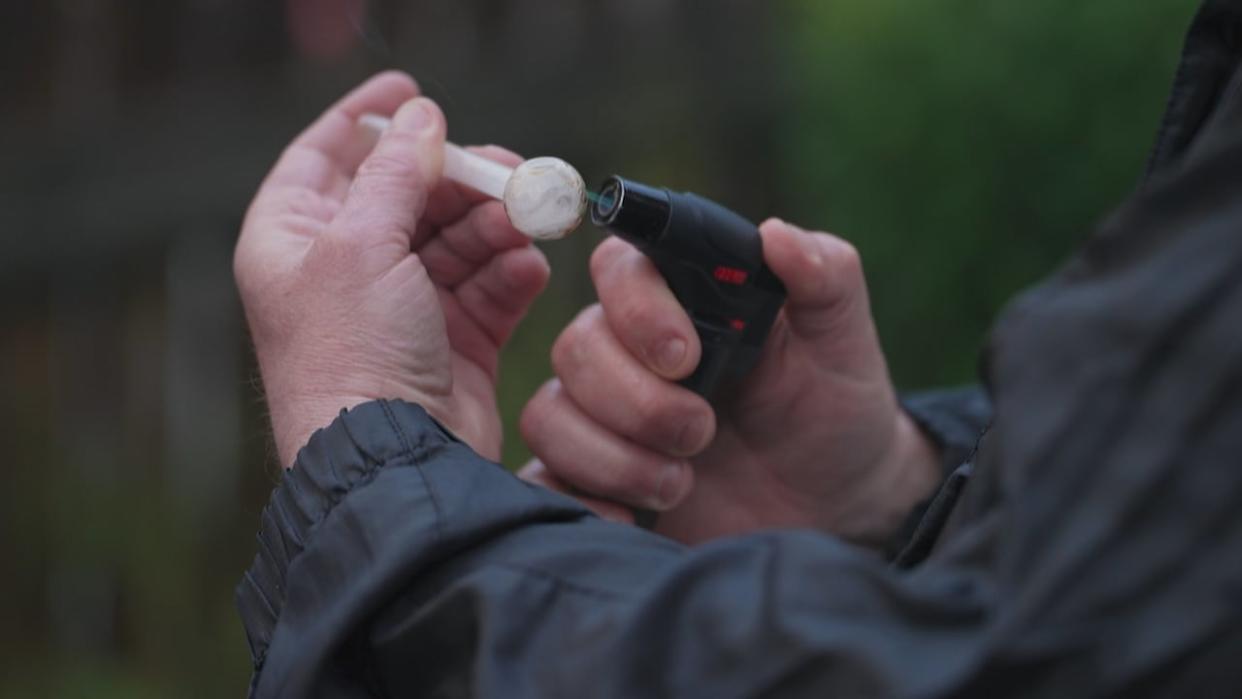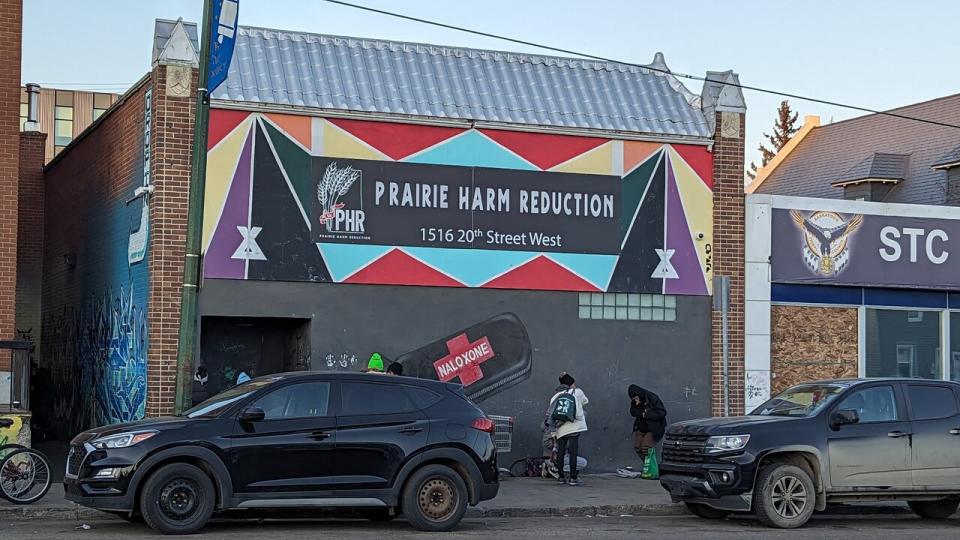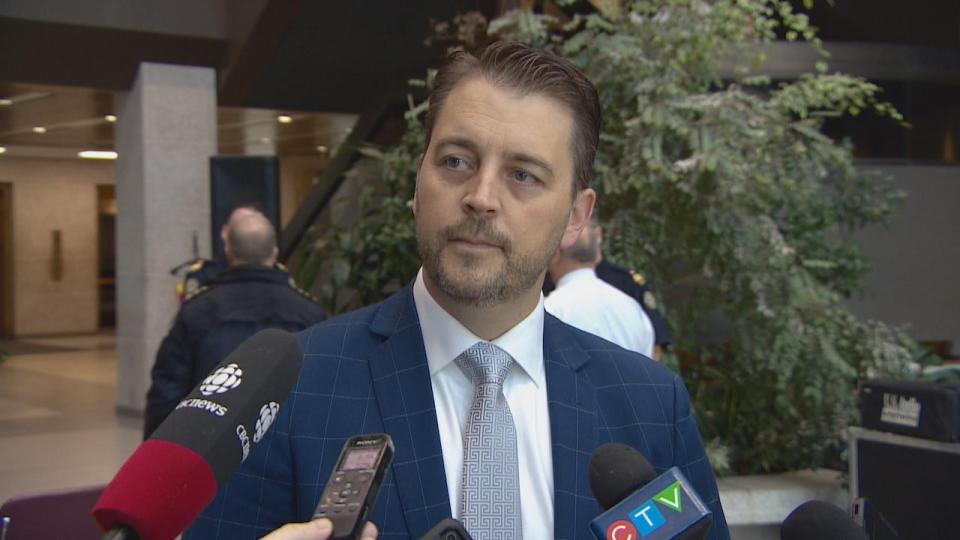Experts condemn Sask.'s move to stop providing pipes, limit needle exchanges

A front-line worker and a professor of public health are condemning a policy change on illicit drug use that Saskatchewan announced Thursday, saying it shows a disregard for human life, sets back efforts to stop the transmission of HIV/AIDs and flies in the face of decades of science.
On Thursday, the province's Ministry of Health said it will no longer provide clean pipes for drug use and instructions on how to use them.
Third party organizations will also not be able to use provincial funds to do so.
"It's incredibly disheartening that the province is making these decisions," said Kayla DeMong, the executive director of Prairie Harm Reduction (PHR), a drug outreach centre in Saskatoon.

Kayla DeMong, executive director of Prairie Harm Reduction in Saskatoon, says the policy shift will be disastrous for drug users across the province. (Dayne Patterson/CBC)
DeMong said the organization is still trying to figure out what this means for PHR. She said it was given no warning and all of its supplies are provided by the Saskatchewan Health Authority.
She said the decision means PHR could be forced to purchase supplies from private vendors, stretching an already tight budget.
"The statements from the province and this position that they are continually taking, they're telling me that the 300 people accessing our services, it doesn't matter if they die," DeMong said.
Saskatchewan started providing clean pipes nearly six years ago. It was meant to help injection drug users transition away from using needles to the safer method of smoking.
The hope was that it could also stop people from injecting drugs in the first place, with an overall goal of reducing the spread of HIV and Hepatitis C through used needles.
Tim McLeod, the province's mental health and addictions minister, said in an interview that the policy change should tell people "there's hope for recovery."
"Providing crack pipes and instructions on how to use illicit drugs sends the wrong message. It's giving individuals the impression that using illicit drugs is somehow safe or condoned," McLeod said.
When asked whether the change puts people in more danger, McLeod emphasized that "no illicit drugs are safe."
The announcement comes after a report from the Saskatchewan Coroners Service indicated the number of drug toxicity deaths in 2023 are likely to set a provincial record.
There were 484 confirmed and suspected drug toxicity deaths in Saskatchewan in 2023. Depending on how many of the 193 suspected drug toxicity deaths are confirmed, that total could surpass the record set in 2021, when there were 404 deaths — the highest number of deaths in publicly available data from the Saskatchewan Coroners Service, which dates back to 2010.
Changes to needle exchanges
The province will also require needle exchanges receive used needles before handing over clean ones.
McLeod said needle exchanges in the province were always intended to be an exchange so that the centres could get the same number of needles that were being provided.
"There was a slow but unauthorized shift away from that to more of a needle distribution, and that was never intended to be the model and that doesn't respect the needs of our communities," McLeod said.
The minister said the change will ensure used needles are no longer left in communities, while also limiting the spread of blood-borne diseases.
Elaine Hyshka, an associate professor with the University of Alberta's School of Public Health, said the province's explanation for implementing a "one-for-one" needle exchange is baffling and will likely do the opposite of what the minister described.
"That policy hasn't really been endorsed for over 25 years because the science is quite clear: it's ineffective," said Hyshka, who is also the Canada Research Chair in health systems innovation.
"This is really counterproductive in terms of supporting recovery of people living with substance use disorders and it will have the side effect of increasing infectious disease rates in Saskatchewan," Hyshka said.
Saskatchewan remains a hot spot for HIV in Canada, according to 2022 data from the Public Health Agency of Canada.
The rate of new diagnoses of HIV in Canada is 3.8 per 100,000 people. In Saskatchewan, the rate is 20.3 per 100,000 people.

Saskatchewan's Minister of Mental Health and Addictions Tim McLeod was unable to provide any evidence used to guide the province's policy shifts Thursday. (Kirk Fraser/CBC News)
In the interview Tuesday, McLeod was unable to point to a single piece of evidence that helped the province make the decision to changes its policies.
Instead, he repeatedly pointed to how the changes are part of the provinces transition to a "recovery-oriented system of care."
The province announced a new action plan for mental health and addiction last fall, with the goal of adding at least 500 more addictions treatment spaces to double treatment capacity in the province.
A total fo 168 treatment spaces have been announced so far, including:
26 post-treatment spaces at Joseph's Addiction Recovery Centre in Estevan.
32 intensive outpatient treatment spaces through Possibilities Recovery Centre in Saskatoon.
36 virtual treatment spaces through EHN Canada, a national network of treatment centres.
14 inpatient treatment spaces at the former Drumming Hill Youth Centre facility in North Battleford.
60 other inpatient treatment spaces through EHN Canada.
Naloxone will continue to be provided for free at more than 400 locations throughout the province, the Ministry of Health confirmed.
Since the take home naloxone program was introduced in 2015, more than 40,000 people in the province have been trained to use naloxone and nearly 10,000 overdoses have been reversed by members of the public.
Test strips for fentanyl and benzodiazepine contamination will also continue to be available in order to "assist law enforcement and the health care system with monitoring the toxicity of illegal drugs." The use of infrared spectrometres will also continue for same purpose.
The province's new Drug Alert System will enhance those efforts, the Ministry of Health said.


